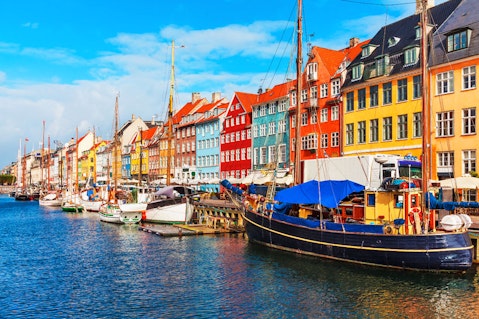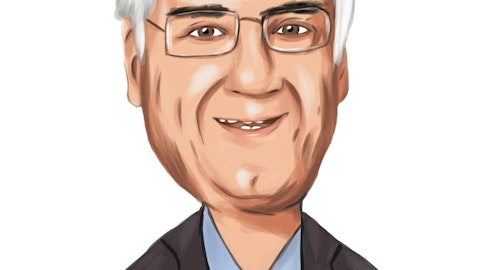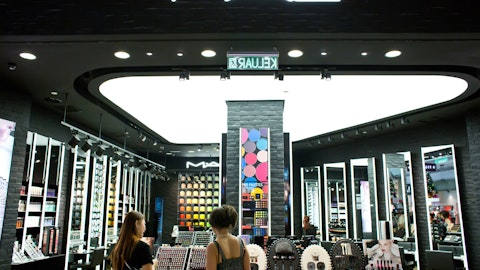In this article we will take a look at the 10 most valuable companies in Europe. However, you can skip our detailed analysis of these European companies, and go directly to the 5 Most Valuable Companies in Europe.
Although Europe is the second smallest continent in the world, it has one of the largest economies with a cumulative GDP of approximately $15.16 trillion as of 2020. With a population of over 746.4 million, Europe has modernized its economy through industrialization, agriculture, and specialization of services. The successful development of the region can be traced back to its history of innovation since the start of the first industrial revolution. Moreover, the European Union has chosen the policy of interconnectedness that has proven fruitful for its 27 member countries.
The coronavirus had a severe economic impact, with the economy dropping by 11.2% in the EU during the second quarter of 2020, which represented the sharpest drop since 1995. However, it was followed by an 11.6% rebound in the following three months. In the first quarter of 2021, the EU GDP inched down by 0.1% following a 0.5% in the previous quarter.
Moreover, small and medium businesses which are an integral part of the economy have also been hit hard by the crisis. According to a McKinsey report, more than 2200 businesses in 5 major European countries have experienced a decline in their profits.

Copyright: scanrail / 123RF Stock Photo
There are many valuable companies in Europe that have established themselves as industry leaders in the world. In this article we rank the 10 most valuable companies in Europe according to their market cap. The total revenues of the companies as of 2020 are also listed for more insight regarding their performance.
Additionally, we’re going to present the hedge fund sentiment for the most valuable companies in Europe. We’re doing this because we believe that this is an important metric that can help assess whether a company is a good long-term investment. Our research has allowed us to identify a select group of stocks that hedge funds have been bullish on. Our picks, which we have been sharing in our monthly newsletters, have returned more than 205% between March 2017 and May 2021, versus 91% for the SPDR S&P 500 ETF Trust (NYSEARCA:SPY) (see the details here).
Without any further ado let’s start the list of the 10 most valuable companies in Europe.
10. British American Tobacco PLC (NYSE:BTI)
Market Cap: $88 billion
Revenue: $35.62 billion
British American Tobacco PLC (NYSE:BTI) is headquartered in London, United Kingdom and is one of the largest tobacco company in the world. The company has shown a strong market position and is the biggest tobacco company in terms of net revenues. BTI has a strong brand portfolio, broad geographical diversification, and substantial pricing power, which is why it was given a Baa2 rating by Moody’s. Overall, British American Tobacco PLC (NYSE:BTI) has shown stable cash flow and EBITDA along with improved debt statistics.
Recently, British American Tobacco PLC (NYSE:BTI) has diversified into the growing cannabis business and acquired a 20% stake in Canadian licensed producer OrganiGram Holdings Inc (NASDAQ:OGI) for $175 million.
At the end of March, there were 15 hedge funds tracked by Insider Monkey bullish on British American Tobacco PLC (NYSE:BTI), including William B. Gray’s Orbis Investment Management, which owns an $800 million stake in the company.
9. Unilever N.V. (NYSE:UL)
Market Cap: $149 billion
Revenue: $59.85 billion
With a market cap of $149 billion, Unilever N.V. (NYSE:UL) ranks ninth in the list of the 10 most valuable companies in Europe. Unilever N.V. (NYSE:UL) is one of the largest consumer goods company in Europe, Asia, Middle East, and the Americas which owns over 400 popular brand names, including Ben & Jerry’s, Dermalogica, Dove, Lipton, Sunsilk, Knorr etc. The company was founded in 1894 and is headquartered in London.
Unilever N.V. (NYSE:UL)’s share price has increased by almost 40% in the past five years.
Recently, Unilever N.V. (NYSE:UL) announced the acquisition of Onnit, a US-based wellness and lifestyle company.
In its fourth-quarter 2020 letter to investors, Lindsell Train mentioned Unilever N.V. (NYSE:UL) as one of its largest holdings:
“One of the biggest holdings here includes Unilever. The way consumers have flocked to such brands in 2020, perhaps for reassurance, has been reassuring for the investors.
In Unilever’s most recent quarterly results the company reported its e-commerce revenues were up 76% year-on-year, up to 10% of the total. This does not mean that Unilever is turning into an Internet business, but it does give reassurance that its brands – from Ben & Jerry’s to Domestos – can remain relevant in an increasingly digital world. By the way – have you tried Unilever’s new Marmite-infused peanut butter? It’s divine.”
8. Royal Dutch Shell plc (NYSE:RDS.A)
Market Cap: $153 billion
Revenue: $180.54 billion
With a market cap of $153 billion, Royal Dutch Shell plc (NYSE:RDS.A) is also one of the 10 most valuable companies in Europe. Royal Dutch Shell plc (NYSE:RDS.A) is a giant petrochemical and energy company based in the Netherlands. It has gas, oil products, upstream, and chemical products segments. Analysts are showing bullish behavior as the firm’s short- and long-term prospects are solidifying.
Recently, Royal Dutch Shell plc (NYSE:RDS.A) has announced that it is working with General Motors Company (NYSE:GM) via its subsidiary MP2 Energy to introduce electric vehicle charging and other energy programs that use renewable resources.
Between January and March, the number of funds from our database bullish on Royal Dutch Shell plc (NYSE:RDS.A) inched up by two to 36, while the aggregate value of these funds’ holdings surged to $2.19 billion from $1.66 billion.
7. Novo Nordisk A/S (NYSE:NVO)
Market Cap: $160 billion
Revenue: $20.14 billion
Denmark-based Novo Nordisk A/S (NYSE:NVO) is a multinational pharmaceutical company with operations in eight countries worldwide. Novo Nordisk A/S (NYSE:NVO) is primarily involved in the research and development of healthcare products.
In June, the company announced that the US Food & Drug Administration approved its new diabetes drug. Later the same month, Walmart Inc (NYSE:WMT) announced entering into an agreement with Novo Nordisk A/S (NYSE:NVO) to launch the first privately produced insulin analog at a much cheaper price.
The company’s financial performance was very strong in the first quarter of fiscal 2021 with an EPS growth of over 8% amounting to $0.88 per share.
Among the top shareholders of Novo Nordisk A/S (NYSE:NVO) is renowned billionaire investor Jim Simons, whose fund, Renaissance Technologies, owns 24.85 million shares of the company worth nearly $1.70 billion as of the end of March. Other investors bullish on Novo Nordisk are Ken Fisher’s Fisher Asset Management, Tom Gayner‘s Markel Gayner Asset Management, and Anand Parekh’s Alyeska Investment Group.
LRT Capital Management mentioned Novo Nordisk A/S (NYSE:NVO) in its first-quarter 2021 investor letter:
“Novo Nordisk is the global leader in insulin, which is, sadly, a growing business as more and more people around the world suffer from diabetes. Millions of people need daily injections of insulin to stay alive, a number that, unfortunately, is likely to continue to grow by millions more in the coming decade. It may seem at first glance that insulin should be a commoditized business, after all, it was discovered and synthesized over a hundred years ago, but nothing could be further from the truth. There are many types of insulin and Novo Nordisk has spent billions on R&D over the years to develop new products. On February 11th, the company reported favorable results from a phase-3 trial of Semaglutide, a drug that is currently used for Type 2 diabetes treatment. The study evaluated the use of Semaglutide for weight loss treatment in non-diabetic patients and found a significant impact on weight loss for patients receiving Semaglutide vs. the placebo control group. If Semaglutide is approved for weight loss treatment, we expect it will be meaningfully accretive to the company’s bottom line.
Furthermore, Novo Nordisk reported Q4 2020 earnings on February 3rd, with flat revenues YoY and EPS growth of +8%. The company’s proprietary product line supports returns on invested capital of over 40%, and while sales growth is relatively slow (+6% annualized CAGR over the past decade), the company’s shares trade at a reasonable valuation of only 21x forward earnings. For a company with an extremely predictable business, high returns on capital, and a forecastable future, we believe this to be highly attractive. Shares are down 1.75% year-to-date.”
6. Volkswagen AG (OTCMKTS:VWAGY)
Market Cap: $166 billion
Revenue: $263.02 billion
Volkswagen AG (OTCMKTS:VWAGY) is a German auto-manufacturer which provides its vehicle under brand names such as Volkswagen, Audi, Bentley, Porsche, Lamborghini, among others. Wolfsburg, Germany-headquartered company has earned the sixth spot among the most valuable companies in Europe.
Although the COVID-19 pandemic substantially slowed down the automobile industry across the world, Volkswagen AG (OTCMKTS:VWAGY) managed to weather this drop during 2020 due to the recovering Chinese market. The company reported profits of $10.7 billion while sales revenue dropped by 11.8% to $267 billion. The number of unit sales was 9.2 million vehicles for 2020. However, for FY 2021, the company has forecasted its operating profit to top pre-pandemic levels due to the strong demand from its American and European markets.
Volkswagen AG’s shares have increased by 5.8% since the start of the year. The company also announced a merger agreement between its trucks segment TRATON and Navistar International which will help Volkswagen solidify its position in the US truck market.
Click to continue reading and see the 5 Most Valuable Companies in Europe.
Suggested articles:
- Top 10 Energy Sector Stocks for 2021
- 10 Best Dividend Stocks for Long Term
- 15 Fastest-Growing Fintech Companies
Disclosure: None. 10 Most Valuable Companies in Europe is originally published on Insider Monkey.





